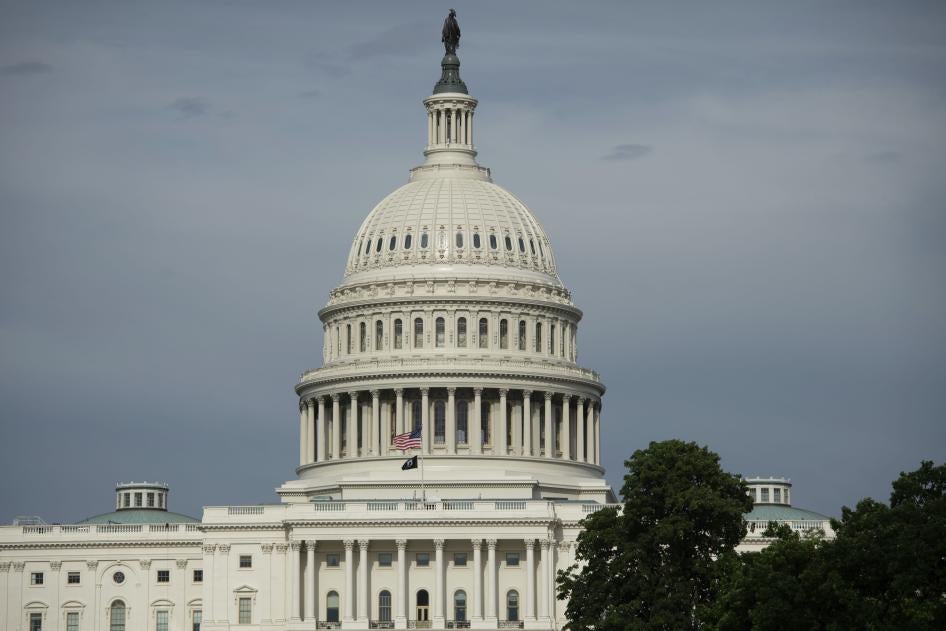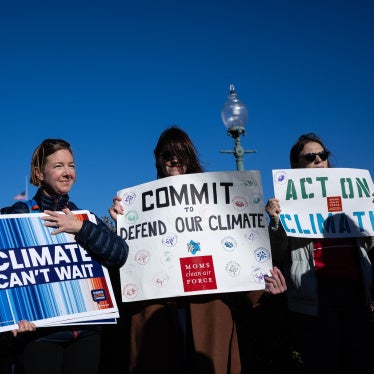(Washington) – The US government’s passage of the Inflation Reduction Act advances the right to health for millions of people in the United States, Human Rights Watch said today. Despite some problematic provisions, the act, signed into law by President Joe Biden on August 16, 2022, is also the most significant step the government has taken to address the climate crisis.
The landmark package of reforms addresses two crises that have profound human rights implications: healthcare affordability and climate change. However, future action building upon the act is needed to fully meet the government’s obligations under international human rights law.
The healthcare reforms in the Inflation Reduction Act of 2022 are more modest than those in the now defunct Build Back Better Act, but they will still be life-changing, lowering drug costs for millions of older adults and making private health insurance more affordable for people with low- and middle-incomes.
“The drug pricing reforms fall short of making essential medicines affordable for all, but they are an absolute game changer and establish a framework for improvement,” said Matt McConnell, economic justice and rights researcher at Human Rights Watch. “The extension of health insurance subsidies is also vital for millions of households already struggling with inflation and healthcare costs. But there is still so much that needs to be done, especially after many insulin provisions were removed from the bill.”
Soaring medicine prices and inadequate health insurance have created a crisis of unaffordable medicine in the US, which undermines the right to health, drives people into financial distress and debt, and disproportionately affects socially and economically marginalized people, Human Rights Watch said.
The act includes significant drug pricing reforms to address this crisis, but they do not lower prices for everyone or adequately address the skyrocketing costs of certain lifesaving medicines, such as insulin. Still, they represent the most significant healthcare reform in the US since the 2010 Affordable Care Act.
Under the Inflation Reduction Act, the US government has taken a first step toward realizing its obligations under international human rights law to regulate drug prices and to ensure that people have equal and affordable access to essential medicines, Human Rights Watch said. The act authorizes Medicare, the US public health insurance program for older people and people with disabilities, to begin negotiating prices for some of the most expensive prescription medicines it covers. It penalizes drug manufacturers that increase the prices of their products at rates faster than inflation and creates a cap on out-of-pocket drug costs for Medicare beneficiaries.
The act also extends federal subsidies that help millions of people afford private health insurance purchased through a government-operated marketplace. These enhanced subsidies were set to expire at the end of this year, which would have potentially caused more than three million people to become uninsured and many more to move to less protective, high-deductible health plans.
Because of the Inflation Reduction Act, the federal government will continue to almost fully cover the cost of health insurance for millions of people, including many working near-poverty wages, until 2025.
Despite the act’s many measures to make health care affordable, its potential impact was significantly weakened by the last-minute removal of two key provisions concerning insulin. Republican Senators gained enough Senate votes to remove language that would have included all insulin products in Medicare negotiation and capped copayments for insulin under all public and private health insurance plans at US$35 a month.
While a copay cap on insulin for all Medicare beneficiaries was ultimately included in the law, the removal of these other provisions amount to a lost opportunity to meaningfully address the nation’s insulin affordability crisis, Human Rights Watch said. Even had these provisions been included, the act still would not have covered people without health insurance, who must often bear the full costs of skyrocketing insulin prices.
The act is the US government’s largest legislative package to address climate change. The US is currently the world’s second-largest greenhouse gas emitter and is responsible for the largest share of global emissions historically. Climate change threatens a range of human rights around the world, including in the US, and particularly affects people with low incomes as well as Black and Indigenous people and people of color as a whole, exacerbating existing structural inequities.
“While the Inflation Reduction Act takes much needed steps to reduce greenhouse gas emissions and stimulate the development of a clean energy economy, it is also a gift to the fossil fuel industry,” said Felix Horne, senior environment researcher at Human Rights Watch. “The United States should do more to support frontline communities instead of increasing its support to an industry among the most responsible for fueling the climate crisis.”
The act will allocate $369 billion to reduce greenhouse gas emissions by investing in renewable energy, promoting energy efficiency, and subsidizing electric vehicles. It is expected to lower US greenhouse gas emissions to 40 percent of 2005 levels by 2030.
In a win for the public health of communities, the act includes funding to reduce air pollution in schools and near major transportation corridors and ports located in low-income communities, and provides financial assistance to improve access to drinking water. It also provides $15 billion to provide rooftop solar power projects in low-income communities.
Despite these promising provisions, the act provides considerable support to the fossil fuel industry, permitting the auction of millions of acres of public lands for oil and gas production and limiting leases on federal lands for renewable energy until oil and gas leasing thresholds have been met.
While these concessions to the fossil fuel industry may have been needed to achieve political support for the act, the potential impact of billions of dollars spent tackling the climate crisis is greatly limited by simultaneously incentivizing more fossil fuel production, Human Rights Watch said. There is growing consensus, including from the International Energy Agency, that for governments to meet global climate targets there cannot be new oil, gas, or coal development.
The Inflation Reduction Act of 2022 is an important step, but the US has much more to do to realize the right to health and to live up to its human rights obligation to tackle climate change, Human Rights Watch said.
The act takes some critical steps towards reducing US greenhouse gas emissions, but it does not do enough to protect the rights of people at the front lines of fossil fuel production and those already affected by climate change, nor will it allow the US to fully meet its emissions reduction goals. The US government should urgently put an end to all forms of support for new oil, gas, and coal development to rapidly reduce emissions in line with its human rights obligations and to limit the human rights impacts of climate change.
The US government is also obligated under international human rights law to ensure that essential medicines, including insulin, are affordable to all people in the country who need it. Congress should promptly enact legislation to meet this obligation by building on the Inflation Reduction Act’s drug pricing reforms. In particular, it should consider legislation to provide free insulin to all insulin-dependent people in the country and to impose caps on list prices for certain medicines. Congress should also further improve the affordability and availability of quality health insurance for low- and middle-income earners.
“The Inflation Reduction Act is a major victory for organizers, activists, and human rights advocates,” McConnell said. “But the concessions made only emphasize how far the US still needs to go.”









